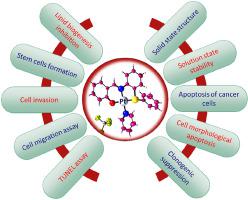European Journal of Medicinal Chemistry ( IF 6.0 ) Pub Date : 2021-10-14 , DOI: 10.1016/j.ejmech.2021.113920 Xue Bai 1 , Amjad Ali 2 , Na Wang 1 , Zongwei Liu 1 , Zhimin Lv 1 , Zeqing Zhang 1 , Xing Zhao 1 , Huifang Hao 3 , Yongmin Zhang 4 , Faiz-Ur Rahman 1

|
Cancer is one of the most aggressive diseases with poor prognosis and survival rates. Lipids biogenesis play key role in cancer progression, metastasis and tumor development. Suppression of SREBP-mediated lipid biogenesis pathway has been linked with cancer inhibition. Platinum complexes bearing good anticancer effect and multiple genes activation properties are considered important and increase the chances for development of new platinum-based drugs. In this study, we synthesized pyridine co-ligand functionalized cationic complexes and characterized them using multiple spectroscopic and spectrophotometric methods. Two of these complexes were studied in solid state by single crystal X-ray analysis. The stability of these complexes were measured in solution state using 1H NMR methods. These complexes were further investigated for their anticancer activity against human breast, lung and liver cancer cells. MTT assay showed potential cytotoxic activity in dose-dependent manner and decrease survival rates of cancer cells was observed upon treatment with these complexes. Biological assays results revealed higher cytotoxicity as compared to cisplatin and oxaliplatin. Further we studied C2, C6 and C8 in detailed mechanistic anticancer analyses. Clonogenic assay showed decrease survival of MCF-7, HepG2 and A549 cancer cells treated with C2, C6 and C8 as compared to control cells treated with DMSO. TUNEL assay showed more cell death, these complexes suppressed invasion and migration ability of cancer cells and decreased tumor spheroids formation, thus suggesting a potential role in inhibition of cancer metastasis and cancer stem cells formation. Mechanistically, these complexes inhibited sterol regulatory element-binding protein 1 (SREBP-1) expression in cancer cells in dose-dependent manner and thereby reduced lipid biogenesis to suppress cancer progression. Furthermore, expression level was decreased for the key genes LDLR, FASN and HMGCR, those required for sterol biosynthesis. Taken together, these complexes suppressed cancer cell growth, migration, invasion and spheroids formation by inhibiting SREBP-1 mediated lipid biogenesis pathway.
中文翻译:

铂络合物抑制 SREBP 介导的脂质生物合成和激活多种抗癌机制:归因于新抗肿瘤策略的可能性
癌症是最具侵袭性的疾病之一,预后和生存率都很差。脂质生物发生在癌症进展、转移和肿瘤发展中起关键作用。抑制 SREBP 介导的脂质生物合成途径与癌症抑制有关。具有良好抗癌作用和多基因激活特性的铂络合物被认为很重要,并增加了开发新的铂基药物的机会。在这项研究中,我们合成了吡啶共配体功能化的阳离子配合物,并使用多种光谱和分光光度法对其进行了表征。通过单晶 X 射线分析在固态下研究了其中两种配合物。使用1在溶液状态下测量这些配合物的稳定性核磁共振方法。进一步研究了这些复合物对人乳腺癌、肺癌和肝癌细胞的抗癌活性。MTT 测定以剂量依赖性方式显示潜在的细胞毒活性,并且在用这些复合物处理后观察到癌细胞的存活率降低。与顺铂和奥沙利铂相比,生物测定结果显示更高的细胞毒性。此外,我们在详细的机械抗癌分析中研究了C2、C6和C8 。克隆形成测定显示用C2、C6和C8处理的 MCF-7、HepG2 和 A549 癌细胞的存活率降低与用 DMSO 处理的对照细胞相比。TUNEL 检测显示更多的细胞死亡,这些复合物抑制了癌细胞的侵袭和迁移能力,减少了肿瘤球体的形成,因此表明在抑制癌症转移和癌症干细胞形成方面具有潜在作用。从机制上讲,这些复合物以剂量依赖性方式抑制癌细胞中甾醇调节元件结合蛋白 1 (SREBP-1) 的表达,从而减少脂质生物合成以抑制癌症进展。此外,甾醇生物合成所需的关键基因 LDLR、FASN 和 HMGCR 的表达水平降低。总之,这些复合物通过抑制 SREBP-1 介导的脂质生物合成途径来抑制癌细胞的生长、迁移、侵袭和球状体的形成。











































 京公网安备 11010802027423号
京公网安备 11010802027423号